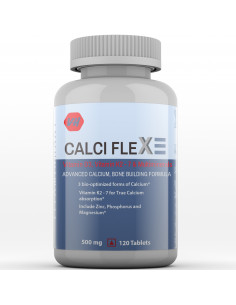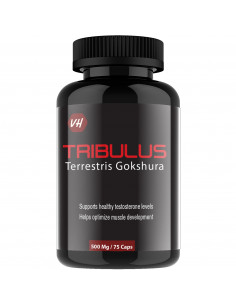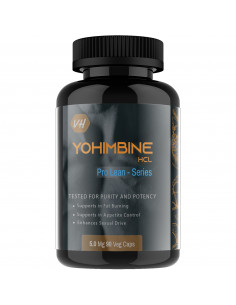- Supplement
- 7 likes
- 6306 views
Recently yohimbe, or more precisely, its active ingredient yohimbine hcl, has been the subject of some heated arguments and debates among fitness enthusiasts and industry trainers alike. While it was originally considered a flop of a supplement, because it did not shot up testosterones levels as first supported, it had developed a bit of a cult following by some men for its reported ability to increase support sexual health.
However, many or all supplement manufacturers have recently claimed that it can also aid in the loss of stubborn fat – hard to melt away; those areas that just won't lean out no matter how hard we diet and exercise. Typically, these areas are located in the midsection of men, and on the glutes and thighs of women and abdomen.
With all the claims and hype being put around, we asked our own Research team on supplements to do a little reading on what the current research says, and shed some light on the subject for all of us.
Yohimbe is a small evergreen tree native to Africa, and the scientific name is Pausinystalia yohimbe. Chemically, Yohimbe bark contains a substance called yohimbine, plus additional similar compounds, known as indole alkaloids.
Presently, yohimbe bark is mostly found being used in male aphrodisiac preparations, but some supplement manufacturers have claimed that it can aid fat loss as well ?
Mechanism of Action:
Medically explained, yohimbine is a pre-synaptic alpha-2-adrenergic blocking agent, also referred to as an alpha 2-adrenergic antagonist. This action increases sympathetic nervous system activity, and can result in increasing the amounts of epinephrine (also known as adrenaline) andnorepinephrine in the blood stream. The sympathetic nervous system is involved in controlling the body's response to stress, and also triggers and controls the fight or flight responses.
The main effects epinephrine and norepinephrine have on the body includes increasing blood pressure and heart rate. Paradoxically, in low dosages yohimbine may help support healthy blood pressure already in normal range. This is thought to occur by causing dilation of blood vessels, thereby reducing vascular resistance. This central nervous system stimulation causes anxiety in some people.
Yohimbine For Supporting Sexual Health
Always consult your doctor when using yohimbine-containing products
In the 1960's, studies were conducted using a combination supplement called Nux Vomica, which contained yohimbine and methyl testosterone. Nux Vomica was found to be effective after 2 to 3 weeks of use in most cases, various side effects were observed (see below). Keep in mind, however, no conclusive studies using the botanical Yohimbe have been published which show the same effects. Researchers E. Ernst and M.H. Pittler recently reviewed several studies concerning the use of the supplement yohimbine for erectile dysfunction.
Serious side effects observed in these short-term studies were infrequent and reversible. Side effects reported using yohimbe bark extracts include: nervousness, irritability, insomnia, headache, skin flushing, anorexia, nausea, gastric distress, diarrhea, vomiting, palpitations, tachycardia, dysuria, pain, increased blood pressure, dizziness, sweating, weight gain, constipation, and anxiety. Always consult your doctor when using yohimbine-containing products.
Vitaminhaat's Tribulus Terrestris INCREASES STAMINA, ENERGY AND LIBIDO - Powerful enhancer of your Testo levels for post-workout benefits
Do not use while taking any medications, or if other medical problems exist, such as; angina pectoris, depression, other psychiatric illness, heart disease, high blood pressure, kidney disease, or liver disease. Do not exceed the recommended dosage for Yohimbine, as an overdose could, in extreme cases, result in death.
Generally, yohimbine is not recommended for use by females for libido enhancement, and certainly is not to be used during pregnancy. [Note that a group of researchers conducted a study using yohimbine in women with decreased libido, and observed that the yohimbine supplementation was not effective in supporting their sexual health.]
Yohimbine and Weight Loss
The use of yohimbine for weight loss is inconclusive, and in this author's opinion not to be recommended due to the potential side effects. Some research has been conducted, and some of the key studies will be reviewed below. Keep in mind, though, that just because investigators have conducted research on using the supplement yohimbine, does not mean that such studies should automatically be used to endorse the self-prescribed use of this supplement.
Alpha-2 receptors are common in sites of the body that tend to preferentially accumulate fat; abdomen, breasts, buttocks and thighs. When exposed to circulating catecholamines, such as norepinephrine and epinephrine, alpha-2 receptor sites inhibit lipolysis (the release of fatty acids), while the beta receptors stimulate lipolysis. Generally speaking, epinephrine, norepinephrine, glucagon, adrenocorticotropic hormone (ACTH), and growth hormone stimulate the release of fatty acids from adipose tissue into the blood stream. Once in the blood stream, fatty acids are usually rapidly oxidized if the fatty acid blood concentration is not elevated from fatty acid input resulting from a meal.
Alpha-2 receptors are common in sites of the body that tend to preferentially accumulate fat; abdomen, breasts, buttocks and thighs.
Generally, when fatty acid blood concentration is high, it favors fat storage, which results from over-eating and inactivity. Although, keeping in mind that fatty acids are always used for energy, it is the balance between the amount of fatty acids ingested versus their use for energy that determines how much ends up stored as fat. Of course, this is a rather simplistic explanation of fatty acid metabolism. There is much more involved in these fat storage/utilization dynamics.
Hypothetically speaking, blocking the alpha-2 receptors might be useful during weight loss to free up the catecholamines like norepinephrine, making more available to stimulate beta receptor sites, resulting in a higher rate of lipolysis. Also, yohimbine, through its alpha 2-adrenergic receptor antagonist activity, has been shown to increase levels of norepinephrine in the blood stream.
Galitzky and coworkers observed during their 14-day study of yohimbine treatment that lipid-mobilizing effects were sustained during this study period. This research collaborated their earlier observations found using yohimbine as a lipid-mobilizing agent, as well as from the research of Lafontan and coworkers.
Is Yohimbine An Effective Weight Loss Aid?
There are other nutritional aids that can result in greater weight loss, with fewer or no side effects.
Kucio and coworkers conducted research looking for answers to this very question. In their research report, titled, "Does yohimbine act as a slimming drug?" they found an interesting answer. In this study, twenty female subjects were first subject to a 3 week 1,000 Calorie per day diet. After this 3 week period, 10 subjects were given yohimbine and the other 10 were given a placebo for three additional weeks, in addition to the 1000 Calorie per day diet. For Calcium , Vitaminhaat's CALCIFLEX is an advanced, patent pending calcium formula, calcium tablets, with superior bone-mass building capabilities than ordinarily found calcium supplements.
They found that the yohimbine treatment significantly increased weight loss; 3.55 kilograms body weight lost in the yohimbe group versus 2.21 kilograms body weight lost in the placebo group. However, there was not a significant effect on lipolysis observed, nor did treatment with yohimbine delay the gastric emptying rate. Keep in mind that while over two pounds more weight was lost by the yohimbine taking group, there were no measurements of where the weight was lost, body fat or muscle, and that these results were observed in sedentary females, eating 1000 Calories per day.
Also, there are other nutritional aids that can result in greater weight loss, with fewer or no side effects. The researchers concluded that further research is warranted to determine the applicability of using alpha 2-receptor inhibitory supplements as supplementary management in the treatment of obesity.
Waluga and coworkers went on to examine what the combined effects of caffeine and yohimbine were on cardiovascular function and rate of weight loss. To do this they divided twenty-seven healthy women, into three groups of 9. The first group received only a very low calorie diet (400 Calories per day) and a placebo. The second group received the same diet, and caffeine supplement treatment. The third group received the same diet, and caffeine treatment used in group 2, plus yohimbine.
The treatment lasted for 10 days. At the end of the study the researchers observed a significant reduction in body mass in all groups, with no statistical difference between the groups; Group 1 lost 3.3 kilograms of body weight, group 2 lost 3.5 kilograms of body weight, and group 3 lost 3.4 kilograms of body weight. Although no significant results were seen between the groups, the researchers pointed out that this study was only 10 days long, and that the subjects were on a very low calorie diet, which may have distorted any weight loss effects of the supplements, or was too short to distinguish the real effects reported by other researchers.
However, the main aim of the study was to determine adverse effects of the supplement treatment on the cardiovascular system, and in fact, the researchers did determine that the inclusion of yohimbine along with the caffeine, did evoke some potentially dangerous changes in the cardiovascular system. They concluded that the addition of yohimbine should be treated with caution, and must be excluded in particular obese individuals with cardiovascular complications.
References
1. Ernst, E. and M.H. Pittler, "Yohimbine for erectile dysfunction: a systematic review and meta-analysis of randomized clinical trials", The Journal of Urology, Vol 169, February 1998: 433-436.
2. Galitzky, J., et al., "Alpha 2-antagonist compounds and lipid mobilization: evidence for a lipid mobilizing effect of oral yohimbine in healthy male volunteers.", Eur J Clin Invest, Vol. 18(6), 1988: 587-594.
3. Kucio, C., et al., "Does yohimbine act as a slimming drug?", Isr J Med Sci, Vol. 27(10), 1991: 550-556.
4. Lafontan, M., et al., "Alpha-2 adrenoceptors in lipolysis: alpha 2 antagonists and lipid-mobilizing strategies.", Am J Clin Nutr, Vol 55(Suppl), 1992: 219S-227.
5. Margolis, R., et al., "Clinical studies on the use of Afrodex in the treatment of impotence: statistical summary of 4000 cases.", Current Therapeutic Research, Vol. 9, No. 4, April 1967: 213-218.
6. Margolis, R. and C. H. Leslie, "Review of studies on a mixture of Nux Vomica. Yohimbine and Methyl Testosterone in the treatment of impotence.", Current Therapeutic Research, Vol. 8, No. 5, May 1966: 280-284.
7. Murburg, M.M., et al., "Effects of yohimbine on human sympathetic nervous system function.", J Clin Endocrinol Metab, Vol. 73(4), 1991: 861-865.
8. Piletz, J.E., et al., "Plasma MHPG response to yohimbine treatment in women with hypoactive sexual desire.", Journal of Sex & Marital Therapy, Vol. 24, 1998: 43-54.
9. Waluga, M., et al., "Cardiovascular effects of ephedrine, caffeine and yohimbine measured by thoracic electrical bioimpedance in obese women.", Clinical Physiology, Vol. 18(1), 1998: 69-76.

















